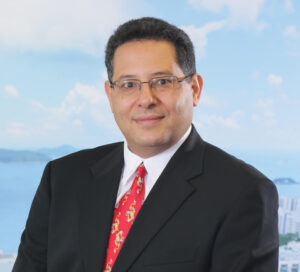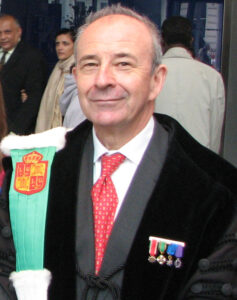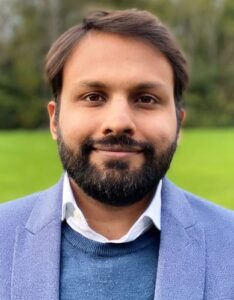AI-Enabled 6G: Embracing Wisdoms from Classical Algorithms |
||
|
Abstract: The past five years have witnessed ever-increasing research interests in artificial intelligence (AI) for the design of 6G wireless systems [1,2]. Despite the unprecedented performance gains, the black-box nature of existing AI algorithms has aroused many crucial concerns, e.g., insufficient scalability, poor generalization, and the lack of theoretical guarantees, which contradict the stringent reliability requirements in practice. By contrast, classical algorithms mostly enjoy well-grounded theoretical analysis. However, built upon simplified signal and system models, their performance tends to be limited in complicated real-world deployments. In this talk, we begin by introducing 6G vision, challenges, and opportunities. Then and by bridging AI with the wisdoms from classical algorithms, we introduce two general frameworks that may offer the best of both worlds, i.e., both competitive performance and theoretical supports. The first framework, called neural calibration, targets low-complexity non-iterative algorithms. Based on the permutation equivariance property, neural calibrated algorithms can scale with the problem size and generalize with varying network settings, making them suitable for dynamic large-scale systems. The second framework, termed fixed point networks, is compatible with general iterative algorithms that are prevalent in wireless transceiver design. Based on fixed point theory, provably convergent and adaptive AI-enhanced iterative algorithms can be constructed in a unified manner. Along with the general frameworks, we also present their applications to CSI feedback, beamforming, and channel estimation, among others, in emerging 6G wireless systems. [1] K. B. Letaief, Y. Shi, J. Lu, and J. Lu, “Edge Artificial Intelligence for 6G: Vision, enabling technologies, and applications,” IEEE Journal on Selected Areas in Communications, vol. 40, no. 1, pp. 5-36, Jan. 2022. [2] K. B. Letaief, W. Chen, Y. Shi, J. Zhang, and Y-J Zhang, “The roadmap to 6G: AI empowered wireless networks,” IEEE Communications Magazine, vol. 57, no. 8, pp. 84-90, Aug. 2019. |
IEEE Fellow, |
|
|
Biography:Khaled B. Letaief is an internationally recognized leader in wireless communications. He is a Member of the United States National Academy of Engineering, Fellow of IEEE, Fellow of Hong Kong Institution of Engineers, and Member of the Hong Kong Academy of Engineering Sciences. He is the recipient of many distinguished awards, including the 2022 IEEE Edwin Howard Armstrong Achievement Award and 2016 IEEE Marconi Prize Paper Award in Wireless Communications. He is recognized for his dedicated service to IEEE, including President of the IEEE Communications Society (2018–19). He received the BS, MS, and Ph.D. Degrees in Electrical Engineering from Purdue University, in 1984, 1986, and 1990, respectively. |
||
Some Methods to Improve IoT Performance and Cybersecurity |
||
|
Institute of Theoretical & Applied Informatics Polish Academy of Sciences & Laboratoire I3S Univ. Cote d’Azur & Cognitive Networks Ltd, UK |
Abstract: The relative simplicity and lightweight nature of many IoT devices, and their widespread connectivity via the Internet and other wired and wireless networks, raise issues regarding both their performance and vulnerability. Indeed, their own connectivity patterns based on the need to frequently forward and receive, data has given rise to the « Massive Access Problem (MAP) of the IoT » which is a form of congestion caused by the IoT’s synchronized and repetitive data transmission patterns. On the other hand, the opportunity that IoT devices present to malicious third parties for generating highly contagious distributed denial of service (DDoS) and Botnet attacks, is also a subject of concern which is widely studied. Thus this presentation will discuss our recent results and research directions that address both of these issues. Regarding the MAP, we will outline the Quasi-Deterministic Transmission Policy (QDTP), and its main theoretical result, and present trace driven measurements, which show that QDTP can effectively mitigate MAP. We will also show how a Machine Learning approach using novel Auto-Associative Dense Random Neural Networks can detect DDos attacks with a high degree of accuracy, and discuss the potential of « low cost » online learning to protect IoT gateways and devices against Cyberattacks. The speaker gratefully acknowledges research funding from the EC as part of the H2020 GHOST, SerIoT and IoTAC projects. |
|
|
Biography: Erol Gelenbe, FIEEE’86 FIEE’85 FACM’03 FIET’03 FIFIP’19 FRSS’20 FAAIA’22, a graduate of METU (Ankara, Turkey), is renowned for mathematical and data driven modelling of computer systems, the Internet, neuronal networks and gene regulatory networks. Recipient of the 2010 NYU Distinguished Alumnus Award in Engineering, he is ranked by the AMS Mathematics Genealogy Project in the Top 25 individuals who are the “all time world-wide” most prolific PhD supervisors in the Mathematical Sciences. He won the Grand Prix France Telecom of the French Academy of Sciences (1996), and the Mustafa Prize (2017) for his invention of G-Networks and the Random Neural Network, and the ACM SIGMETRICS (2008) Award that stated that he is “the single individual who … made the greatest overall contribution to the field of Computer System and Network Performance Evaluation through original research, mentoring and doctoral training, creation and direction of world class research groups, wide ranging international collaboration”. His career has included named chairs and professorships at the Universities of Liege, Paris-Saclay, Paris-Descartes, NJIT, Duke University,University of Central Florida, Imperial College and now the Polish Academy of Sciences. Active in European research collaborations, he was elected a Fellow of the French National Academy of Technologies, the Academy of Sciences of Belgium, Poland and Turkey, and Honorary Fellow of the Hungarian Academy of Sciences and the Islamic Academy of Sciences. He was recently elected chair of the Informatics Section of Academia Europaea. For his research he is currently ranked first in Electrical and Electronic Engineering and second in Computer Science in Poland. |
||
Leveraging Urban Computing with Smart Internet of Drones |
||
|
Abstract: Urban computing (UC) is an interdisciplinary field that seeks to improve people’s lives in urban areas. To achieve this objective, UC collects and analyzes data from several sources. In recent years, the Internet of Drones (IoD) has received significant attention from the academia community and has emerged as a potential data source for UC applications. The goal of this talk is to examine how IoD can connect and leverage UC in variety of applications which include: public safety and security, environment, traffic improvement, drone-assisted networks, just to mention a few. In this context, data acquired by IoD can fill gaps in data collected from other sources and provide new data for UC considering the aerial view of drones. Thus, we shall first introduce the relationship between the concepts of UC and IoD, and then discuss our proposed general framework considering the perspective of IoD for UC followed by design guidelines of the Internet of drones location privacy protocols. Last but not least, we shall discuss some key challenges in this emerging area. |
Canada Research Chair Tier-1 and Distinguished University Professor, University of Ottawa, Canada |
|
|
Biography: Azzedine Boukerche is a Distinguished University Professor and holds a Senior Canada Research Chair Tier-1 position at the University of Ottawa, Canada. He is a Fellow of IEEE, a Fellow of the Canadian Academy of Engineering, a Fellow of the Engineering Institute of Canada, and Fellow of American Association for the Advancement of Science. He is the founding director of the PARADISE Research Laboratory, and DIVA Strategic Research Network at the School of Electrical Engineering and Computer Science (EECS), Ottawa. Prior to this, he held a faculty position at the University of North Texas, and he was a senior scientist at the Simulation Sciences Division, Metron Corp., San Diego. He spent a year at the JPL/NASA California Institute of Technology, where he contributed to a project centered on specification and verification of the software used to control interplanetary spacecraft operated by JPL/NASA Laboratory. His current research interests include Intelligent transportation, Connected and Autonomous vehicles, IoT, Wireless sensor networks, wireless networks, wireless multimedia, performance evaluation and modeling of large-scale distributed systems, distributed and urban computing, and distributed and parallel simulation. He has published several research papers in these areas, and he received about 18 Best research paper awards. He has been serving as an Associate Editor of several journals, ACM Computing Surveys, IEEE Transactions on Distributed Systems, IEEE Transactions on Cloud Computing, IEEE TVT, Elsevier Ad-Hoc Networks, Wiley International Journal of Wireless Communication and Mobile Computing, Wiley Security and Communication Network Journal, Elsevier Pervasive and Mobile Computing Journal, IEEE Wireless Communication Magazine, and Elsevier Journal of Parallel and Distributed Computing. He was the recipient of the Premier of Ontario Research Excellence Award, Ontario Distinguished Researcher Award, Glinski Research Excellence Award, IEEE CS Golden Core Award, IEEE Canada Gotlieb Medal Award, IEEE ComSoc Exceptional Leadership Award, IEEE TCPP Exceptional Technical and Leadership Award, and IEEE ComSoft Exceptional Technical Achievement Award, and the IEEE ComSoc IoT AHSN Technical Achievement Award. He served as the General Chair for numerous IEEE/ACM sponsored International Conference, He is a Steering Committee chair for the IEEE Transactions on Sustainable Computing, and several IEEE/ACM conferences. He has served as Vice Chair of the IEEE CS Fellow Committee, and the IEEE VT Fellow Committee. He also served on the Hiring committee for EiC for ACM Computing Surveys, and IEEE Transcations on Sustainable Computing. He was the past EiC for ACM-ICPS. |
||
Generative Artificial Intelligence: Opportunities and Challenges |
||
|
IEEE Fellow, Professor of ML at MBZUAI, UAE |
Abstract: The talk presents recent trends and significant advances in Artificial Intelligence (AI), namely Generative Artificial Intelligence (GAI). As demonstrated by impressive accomplishments made in the field (such as ChatGPT, BARD, LLaMA and other generative AI-based engines) and due to fundamental advances in machine learning and artificial intelligence, many predict we are at the cusp of a new technological revolution, the impact of which will affect all humanity. AI is expected to grow the world GDP by up to 20% by 2025. This amounts to more than 15 Trillion dollars of growth over the next few years. These developments have impacted significantly technological innovations in the fields of Internet of Things, self-driving machines, powerful chatbots, virtual assistants, human machine intelligent interfaces, large language models, real-time translators, cognitive robotics, high quality disease diagnosis, remote health care monitoring, financial market prediction, Fintech, to name a few. Although AI constitutes an umbrella of several interrelated technologies, all of which are aimed at imitating to a certain degree intelligent human behavior or decision making, deep learning algorithms are considered to be the driving force behind the explosive growth of AI and their applications in almost every sector of the modern and global economy. The talk outlines major milestones that led to the current growth in AI, and GAI, the role of academic institutions, industry, and government and discusses some of the significant achievements in the field. It also highlights real challenges when these innovations are misused, leading to potential adverse effects on the society and the end-users. |
|
| Biography: Fakhri Karray is the founding co-director of the University of Waterloo Artificial Intelligence Institute and is the Loblaws Research Chair in Artificial Intelligence in the Department of Electrical and computer engineering at the University of Waterloo, Canada. He is also a Professor of Machine Learning and the former Provost at the Mohamed bin Zayed University of Artificial Intelligence (MBZUAI), a graduate-level, research based artificial intelligence (AI) university in Abu Dhabi, UAE. Fakhri’s research interests are operational AI, cognitive machines, natural human-machine interaction, and autonomous and intelligent systems. Applications of his research include virtual care systems, cognitive and self-aware devices/robots/vehicles, predictive analytics in supply chain management and intelligent transportation systems. Recent work of Fakhri and his research team on deep learning based driver behavior recognition and prediction has been featured in The Washington Post, Wired Magazine, Globe and Mail, CBC radio and Canada’s Discovery Channel. He serves as Associate Editor and member of the editorial board of major publications in intelligent systems and information fusion. His most recent textbook in foundational machine learning, “Elements of Dimensionality Reduction and Manifold Learning,” was published by Springer Nature in February 2023. He was honored in 2021 by the IEEE Vehicular Technology Society (VTS) with the IEE EVTS Best Land Transportation Paper Award for his pioneering work on improving traffic flow prediction with weather Information in connected cars using deep learning and AI. His recent work on federated learning in communication systems, earned him and his co-authors the 2022 IEEE Communication Society’s MeditCom Conference Best Paper Award. Fakhri is the co-founder and Chief Scientist of Yourika.ai, a provider of AI based online learning systems. He is a Fellow of the IEEE, a Fellow of the Canadian Academy of Engineering, and a Fellow of the Engineering Institute of Canada. He served as a Distinguished Lecturer for the IEEE and is a Fellow of the Kavli Frontiers of Science. Fakhri received the Ing. Dip degree in electrical engineering from the School of Engineering of the University of Tunis, Tunisia and the PhD degree from the University of Illinois Urbana-Champaign, USA. |
||
Visible light communication (VLC) for cars |
||
|
Abstract: Visible light communications (VLC) is a promising technology for automotive applications because it offers several advantages over traditional wireless communication technologies using radio waves. For example, VLC is more secure, as it is difficult to intercept VLC signals, and VLC is more reliable, as VLC signals are less susceptible to interference from other signals. As a result of these advantages, VLC is being considered for various automotive applications, such as in-car infotainment and navigation systems, advanced driver assistance systems (ADAS), and autonomous driving. In this talk, he will explain VLC for cars using image sensor communication, one of the VLCs that use a camera as a receiver. |
Professor and Deputy Director at the Institute of Liberal Arts and Sciences, Nagoya University, Japan. |
|
| Biography: Dr. Takaya Yamazato is a professor and Deputy Director at the Institute of Liberal Arts and Sciences, Nagoya University, Japan. In 1998, he gave a half-day tutorial entitled “Introduction to CDMA ALOHA” at the IEEE GLOBECOM held in Sydney, Australia. In 2006, he received the IEEE Communication Society’s Best Tutorial Paper Award. He served as the co-chair of the Wireless Communication Symposia of the IEEE ICC 2009 and is the co-chair of Selected Areas in Communication Symposia of the IEEE ICC 2011. From 2008 to 2010, he served as the chair of the Satellite and Space Communication Technical Committee of the IEEE Communication Society. In 2011, he gave a half-day tutorial entitled “Visible Light Communication” at the IEEE ICC 2011 held in Kyoto, Japan. In addition, he served as the editor-in-chief of the Japanese Section of IEICE Transactions on Communications from 2009 to 2011. From 2016 to 2017, he was the Director of the Asia/Pacific Board, the IEEE Communication Society. He co-chaired the 8th and 9th IEEE GLOBECOM Workshop on Optical Wireless Communications (OWC’18 and OWC’20). In addition, he was the Chair of the IEICE Communication Society Editorial Board from 2020 to 2021. Currently, he is the Chair of IEICE Tokai Section and the Director of IEICE Communication Society Journal Publication. His research interests include visible light communication, ITS, and stochastic resonance. |
||
Artificial Intelligence for Diabetes |
||
|
University of West Bohemia, Faculty of Applied Sciences – Department of Computer Science and Engineering
|
Abstract: Diabetes mellitus is a group of heterogeneous, civilization diseases. It is 8th common cause of death. It manifests with elevated blood glucose, which continuously damages various organs and contribute to a development of additional diseases. To treat an advanced form of the disease, we need to manage blood glucose level with insulin. As the management is actually a hard problem, artificial intelligence can explore many decisions to find the most effective ones, which is unfeasible for a patient without a smart device. Actually, there are three areas, in which the artificial intelligence can help – glucose level predictor, artificial pancreas construction and metabolic simulator. Using selected studies, we will present state-of-the-art, artificial-intelligence approaches to each of these three topics to demonstrate how to deal with the design, implementation and verification. |
|
Decarbonising the built environment – a technology perspective |
||
|
Abstract: Climate Change is a defining issue of our generation, and for generations to come. The built environment contributes around 39% of global energy related carbon emissions. This session explores ways through which the industry is trying to tackle this behemoth through the use of advanced IoT and communication systems, the gaps that still remain and the next steps which are needed to target net zero carbon. Biography: Sohaib Sheikh is a senior ICT and Smart Buildings professional with multidisciplinary, cross-sector, global consultancy experience. He has expertise in strategy, design, implementation, and commissioning of large-scale complex systems on major international capital investment programs, particularly in the commercial property and sports sectors across the United Kingdom, Middle East, and Russia. He currently works at Google where he leads strategic global programs. Sheikh has previously delivered keynotes and workshops at 40+ international events including the UNESCO World Science Forum, IEEE Sections Congress, and the World Engineering Education Forum. |
Technical Program Manager, Google, United Kingdom IEEE Educational Activities Board |
|









